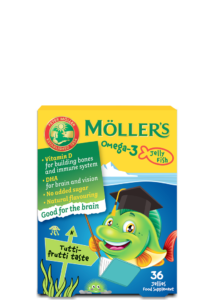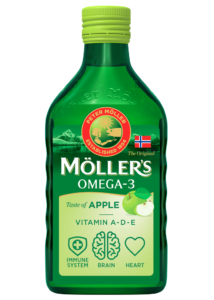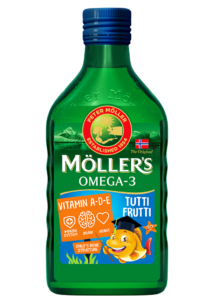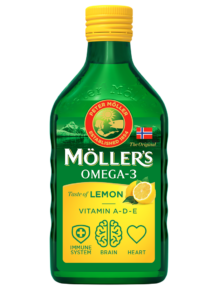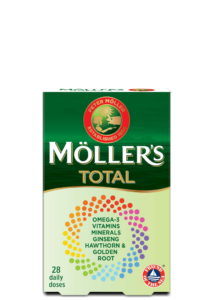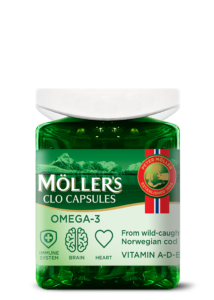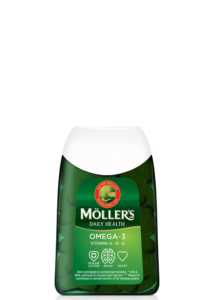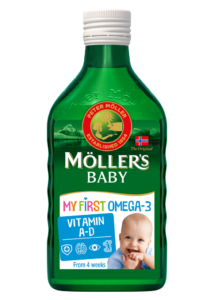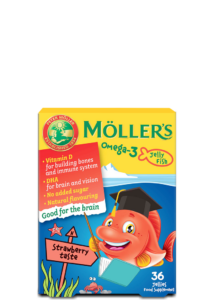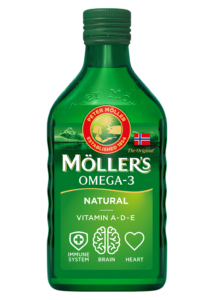Did you know that omega-3 supplements can have positive effects on the development of your breastfeeding baby`s brain and vision?
Home » Why omega-3 is good for breastfeeding mums and babies

As a new parent the thought of being responsible for a whole new life can be overwhelming. It’s completely normal to be worried about making mistakes or doing something wrong.
Read more articles about omega-3 here
Why does baby cry so much? How do I make her sleep? Is she developing as she should? These are questions every parent asks themselves. Remember that it all usually works out and your baby grows up healthy.
Luckily, most people don`t have to worry about what to feed their baby. Nature has already provided you with the optimal food for your newborn – breast milk.
The nutritional content of your breast milk is influenced by what you eat. This is why it’s important to make sure you eat what you need when you are breastfeeding.
Your diet should be nutritionally balanced to provide enough energy for milk production and should contain nutrients that both you and your baby need while you are breastfeeding. The dietary advice for a breastfeeding mum is almost the same as for the rest of the population – with some exceptions.
A nutrient you should pay special attention to during breastfeeding is Omega-3. Omega-3 contains the fatty acid DHA, which contributes to optimal brain and eye development. The brain and eyes go through a tremendous amount of development in the first year of a baby’s life and it is vital that your baby gets enough of this fatty acid.
The best source of omega-3 fatty acids is oily fish but it is challenging to get enough fish in a normal diet. An easy way to give you and your baby the required omega-3 intake is to take cod liver oil every day. Möller’s Cod Liver Oil also contains vitamin D, which is recommended by the NHS for breastfeeding babies.
Becoming a parent is miraculous, but it also brings a new world of worries. It helps to remember that 99% of what you worry about never happens. The important thing is to use common sense, and give your child lots and lots of love.
What is good health?
Do you have a good lifestyle?
Lifestyle simply means the way in which you live. Health and lifestyle go hand in hand. You might feel you have a good lifestyle if you are physically active, eat healthily and generally experience a sense of wellbeing. Conversely, if you want good health you should also have a good lifestyle.
Physical activity is the major contributor to a good lifestyle, but diet, drugs, stress, sleep and social conditions are also play an important role. Being able to use the body properly to avoid injury also affects lifestyle. Physical activity can also prevent depression and help you to recover more quickly from mental illness, both of which obviously affect your lifestyle.
Diet can be a difficult topic for many. Perhaps you eat too much or too little or maybe you find it hard to know what foods to combine to have a balanced diet. It’s also important to eat food that contains important vitamins, minerals and dietary fibre, omega-3 and antioxidants. On top of all this, you also need to get enough energy, protein and the correct fatty acids. The requirement for these nutrients changes throughout your life. When you are older you also have different requirements than children and younger adults. Women also have different requirements than men. Pregnant and breastfeeding mothers also have special requirements.
When you get older, you lose muscle mass and your body requires less energy and therefore less food. You may lead a less active life than you did before, which is why you require less food. However, your need for minerals, vitamins and other nutrients remains the same. Of course, there are plenty of healthy and active older people, but when you reach 70 to 80 years of age, it’s easier to become ill, especially during flu season.
Some steps you can take to improve your lifestyle and health are to:
- eat a healthy and varied diet
- stay active
- watch your weight
- avoid too much alcohol and don’t smoke
- get enough sleep
- think positive
- practise good hygiene
What is good quality of life?
The World Health Organisation (WHO) defines quality of life as a state where the individual can realise their potential, cope with normal stressful situations, work in a rewarding and positive way, and be able to contribute to others and society.
Quality of life is a wide and somewhat diffuse concept that includes joy in, and a desire for, life. These are values that are rather felt than measured, which in turn are based on personal environment and choices. Quality of life doesn’t necessarily depend on being healthy or sick. It’s the moments between worries, sorrows, problems and ailments that matter. For example, if you have a chronic illness, a feeling of mastery can be important when talking about quality of life.
To sum up, quality of life is a combination of health, lifestyle, networks and social support. It’s about experiencing joy, meaning in life, satisfaction, security and a sense of belonging, as well as being able to use your strengths. It’s also about feeling interest in life, coping with everyday situations and a being committed to something or someone. If you have good quality of life, you will be able to cope better with the inevitable stressful situations in life.
Our products
-
Möller’s Omega-3 Jelly Fish Cola
-
Möller's Omega-3 Jelly Fish Tutti Frutti
-
Möller’s Cod Liver Oil Apple
-
Möller’s Cod Liver Oil Tutti Frutti
-
Möller’s Cod Liver Oil Lemon
-
Möller's Total
-
Möller's Cod liver oil capsules
-
Möller’s Daily Health
-
Möller's My First Omega-3
-
Möller’s Omega-3 Jelly Fish Strawberry
-
Möller’s Cod Liver Oil Natural
Learn more
Exercise program for the elderly
Healthy Aging Healthy Bones
Healthy diet during pregnancy
Brain Healthy Aging
Good health, lifestyle and quality of life – What does it all mean?
Cod Liver Oil Healthy Aging
Get inspiration on our Instagram

